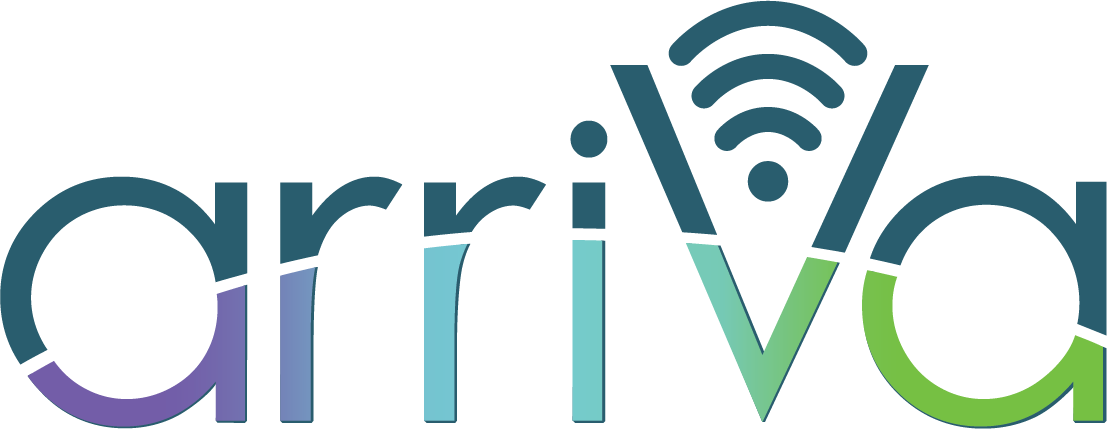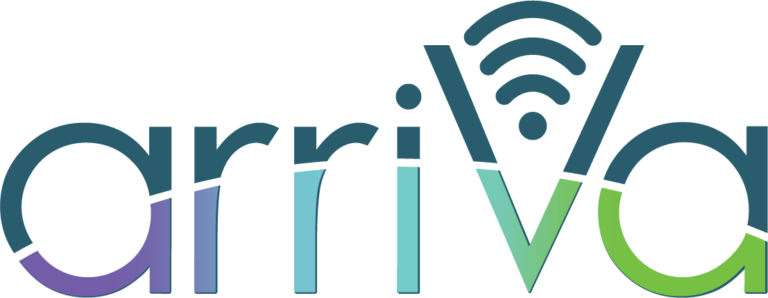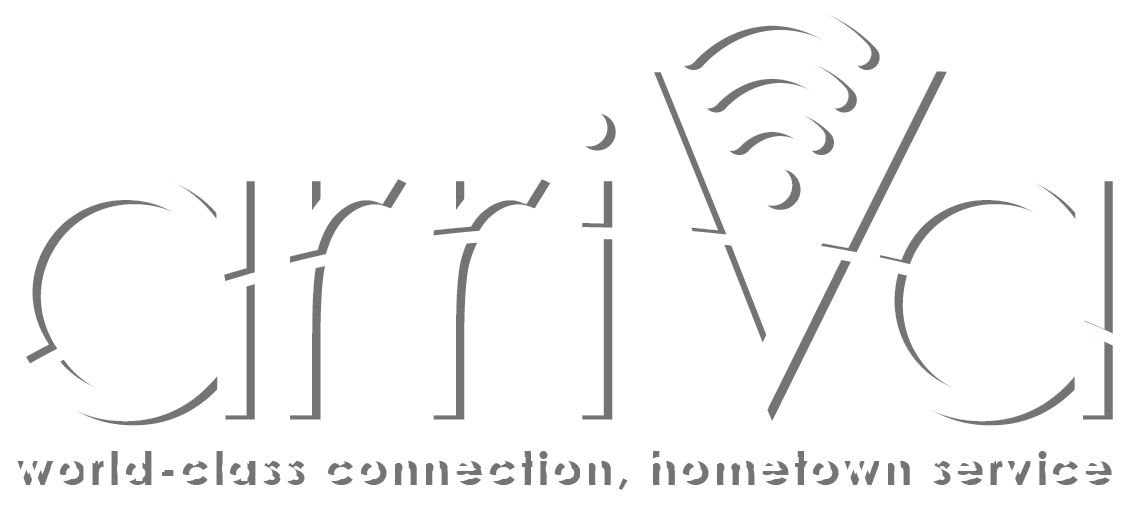FAQs
1. General
You will need a valid government issued photo ID (passport, driver’s license, other state or federal issued identification card that is not expired) and the physical address (911 address) for the location where services will be installed. If you were previously a customer and have a balance on your account, your balance will have to be paid in full before services can be reinstalled. Bruce, MS area customers will need to contact the 911 office (662-412-5000) and request that the information be sent to us.
We can accept orders over the phone, by email, or in person at one of our offices.
Installation will depend on the services you are connecting, but we aim to get you connected within a couple of weeks. There are other factors that may increase or decrease this time and we will make every effort to have your installation scheduled sooner. If you have had prior service with Arriva, your service could possibly be connected quicker. However, if construction is required to provide the service, it can sometimes take longer to get you connected.
Arriva offers a variety of services designed to keep you connected, including fiber-optic broadband, telephone, and business solutions. Our plans cater to varying internet demands from basic browsing and email, to streaming, gaming, and running your business successfully.
Enter your address here to check what packages and speeds are available to you!
Fiber Optic cabling is the fastest way to transmit data. Fiber is comprised of tiny pieces of glass, which transmit data using light pulses. Your data moves lightning fast which means you can enjoy uninterrupted streaming, faster downloads, and smoother video calls.
Yes, Arriva offers comprehensive home phone services. Our plans include unlimited local calling, affordable long-distance rates, and popular features like caller ID, call waiting, and voicemail. Combine our phone service with our internet packages for the ultimate home connectivity solution.
2. Billing & Account
Your first bill is typically higher than your average bill because of the following potential charges:
- A partial month of service if you start service in middle of a bill cycle (prorated charges).
- Your first full month of service billed in advance.
- Incurred installation charges, activation fees, and equipment charges.
- If you are not a new customer and your bill is higher than usual, check for bill details for any fees, mandated charges, or rate changes.
- If you still have questions about your bill, contact us.
Payment on your account is due by the 10th of each month. If payment is not received by the 10th, a late fee will be assessed. If payment is more than 30 days past due, services will be disconnected, and you may be charged a reconnect fee.
- A rental fee for the internet modem/router that our technician has installed at your home or business.
- FCC mandated charges and taxes.
- Other fees may apply in certain instances such as late payment or overdraft.
You will receive your bill on or around the 25th, giving you 15 days to pay in full before the due date of the 10th.
It will require a completed change form and proof of identification.
- In the event of a death, you will be required to provide a death certificate and proof of executorship of the estate.
- In the event of a divorce, both parties will have to sign the ownership change form.
- In the event of a business ownership
3. Voice
Please contact our office and we will be happy to assist you. Please note that changing your phone number may result in additional charges on your next bill.
Perform a visual inspection that all wires and connections are plugged in (both to the wall and the device), and that no cords or connections are damaged.
When using a cordless phone, make there is power to the unit. Perhaps even try a different outlet to see if that restores service. If you have multiple cordless phones, make sure to unplug all of the cordless phones. Then plug a corded phone into the phone jack to see if you receive a dial tone.
When using a corded or rotary phone, check to be sure all phones are properly hung up. If there is still no dial tone please contact us. Please note that Arriva cannot troubleshoot or repair any customer owned equipment.
Voice-over-IP systems need electricity and internet to function. Fiber and VoIP customers may contact our office to inquire about battery backup options to extend voice service during power outages.
4. Internet
We have plans that fit most all customers, please check availability here for more information.
Having multiple devices (computers, laptops, tablets, smartphones, smart TVs, Blu-ray players, video game consoles, streaming set-top boxes, etc.) in daily use by several family members can easily max out your Internet service and make it seem like it’s running slow.
For help determining which Internet plan is right for your household, please contact us.
A firewall is a program or a device that blocks unauthorized access to your computer(s)/network. It helps shield your computer from outside attack and intrusion such as viruses, identity thieves, and hackers. You can think of it as body-armor for your Internet connection. No firewall is 100% foolproof, but in combination with a good anti-virus, a firewall can help make your computer much safer. Even if your router has its own firewall, it is a good idea to also turn on the Windows Firewall or another manufacturer’s firewall product (some antivirus programs come with an optional firewall of their own you can enable).
In addition to a firewall:
An antivirus and an malware software
- Some computers may come with an an virus product already installed when you buy the computer. Many times, those antivirus products may be a free trial version that may have stopped working, so be sure to check to see that it is still working and still receiving updates. If the antivirus software that came with your computer is old, doesn’t work, can’t get updates, or you just don’t like it, check the manufacturer’s website for information on how you can remove it, then you can turn on Windows Defender or install another antivirus, as you choose.
Keeping your operating system (Windows, for example) up to date
- They often take quite a while to download and can slow down lower bandwidth Internet connections for a while during downloading of the updates, but the safety factor of applying the updates can make it well worth the inconvenience.
Safe surfing practices.
- Being careful of what links you click, what emails you open, and what websites you visit is every bit as important as making sure your antivirus is up to date.
No computer or network is 100% safe from a virus or malware attack, but a combination of the above practices and procedures will greatly reduce your risk of compromise.
If the customer rents equipment from our office, we will replace the device at no cost to the customer, as long as damage is not the result of customer negligence. Any equipment damaged due to customer negligence will result in a charge to the customer for the full amount of the equipment. Arriva does not guarantee or troubleshoot any customer owned equipment.
Yes, peak usage Ames are generally from 6 p.m. to 10 p.m. during the weekdays.
Arriva has truly unlimited data. We do not slow speeds or disconnect service, as outlined in our terms of service.
Most devices to date provide wireless access. Arriva does provide rental of modems which have wireless router capabilities. If you are not sure if the modem you have from us is wireless, please contact us.
5. Troubleshooting Internet
Often, when customers notice slow Internet speeds, it is because a device or multiple devices in their house are using an unfair amount of the bandwidth, causing other devices to perform slowly. Other conditions affecting speed may include: customer location, physical equipment limitations (older devices), network congestion, server or router speeds of websites accessed, inside wiring, or telephone conditions. Providing customers with the best Internet service possible is our goal. However, Internet performance may vary due to conditions outside of our network control. Therefore, no minimum level of speed is guaranteed.
a. Try power cycling the device that seems to be running slow (TV, cell phone, etc.).
b. If that doesn’t help, or if all devices are running slow, restart the modem/router by unplugging it from the power source, waiting at least 30 seconds, and then plugging it back in (please do not hit the “reset” button on the modem/router.)
c. If power cycling your devices and modem/router does not solve the problem, please contact us.
You can check your speed at www.speedtest.net
This is a common problem with many different solutions. We suggest purchasing a Wi-Fi extender and placing it in a part of the home that does not receive a quality signal. Please contact our office for assistance installing an extender or mesh unit to enhance your connection throughout your home.
If there is more than one device connected to the network, try another device to see if you can access the internet. If a different device is connected, try reseting the device that has lost connection. If the first device does not connect after reboot, you will need to contact the customer support for that device (i.e. Apple, Windows, etc.) to determine the issue.If you cannot access the internet from any device, unplug the modem for 30 seconds (please do not hit the “reset” button on the modem/router), and power cycle all devices connected to the network. If you are still unable to connect to the internet after restarting the modem and all devices, please contact our office.
My streaming service isn’t working, and I have a strong Wi-Fi signal. Reboot/power cycle the modem and/or router (unplug from the power source, wait at least 30 seconds, plug back in). After rebooting your modem/router, wait a couple of minutes and try again. If this does not work, and power cycling your device does not help, please contact our office.
Our support technicians can verify that the connection is working as it is supposed to. Beyond that verification, if you continue to experience further issues, you should contact your steaming service for assistance. Please note: we do not endorse specific streaming TV services. Please be aware that some video streaming services may be ‘pirate’ services. Our Terms of Service prohibit any illegal use of the Broadband Service.
If you have a router provided by Arriva, the installation technician should have provided you with the password or it may be on a sticker on the router. Sometimes, the Wi-Fi password is also called a ‘WPA key’. The password or WPA key will be case-sensitive. If you cannot locate the password, please contact us.
If you have your own personally purchased router, you will need to refer to the manufacturer’s instructions to set passwords on your router.
Smart RG Routers
If you have a modem/router that is manufactured by Smart RG, your password will be the MAC address stamped on the bottom of your device. It should be entered in lowercase form. Georgia customers: Please use “WiFi Key” or “WPA Key” if listed.
Comtrend Routers
If you have a modem/router that is manufactured by Comtrend with only one antenna, your password will be the MAC address minus the first two digits. It is not case sensitive.
An example would be 64680c6310eb
If you have a modem/router that is manufactured by Comtrend with two antennas, your password will be the MAC address minus the first two digits. It is case sensitive.
An example would be 720c6a4b55ea
Trendnet Routers
If you have a router that is manufactured by Trendnet, your password will be stamped on the bottom of your device, or a Arriva technician may have placed a sticker on the top of your device that will have the “Wi-Fi key” on it.
Note: these devices have to be set up after initial power. In the rare event the hard reset button is pushed, the initial process will have to be repeated.
If the modem has Wi-Fi, the password will likely be the MAC number on the bottom of the modem – depending on the make/model, it could include or exclude the first two digits.
If you have a router only, your password will be on the bottom of the router.
If you have a router provided by Arriva, the installing technician should have provided you with the password or it may be on a sticker on the router. Sometimes, the Wi-Fi password is also called a ‘WPA key’, especially if it is printed on the router’s sticker. The password or WPA key will be case-sensitive. If you cannot locate the password, please contact our office.
When setting up a mail client on your own computer or cell phone, you may be asked to fill in some details about your email account. Below are some of the details which may be asked. Simply fill the values specified below into the fields:
For the incoming account:
Connection Type: IMAP
Port: 993
Security Option: SSL
Hostname: mail.nexband.com
Username: <your email address>
Password: <your password>
For the outgoing (SMTP) account:
Hostname: mail.nexband.com
Port: 587
Security Option: STARTTLS (TLS)
Check “My server requires authentication.”
Username: <your email address>
Password: <your password>
Optional POP Settings:
For the incoming (POP/POP3) account:
Connection Type: POP (or POP3)
Port: 995
Security Option: SSL
Hostname: mail.nexband.com
Username: <your email address>
Password: <your password>
For the outgoing (SMTP) account:
Hostname: mail.nexband.com
Port: 587
Security Option: STARTTLS (TLS)
Check “My server requires authentication.”
Username: <your email address>
Password: <your password>
Exporting your Address Book contacts from Arriva’s neXband email service is quick and easy. The most common scenario for doing this is if you are planning to move your address book to a different email provider or to an email program like
Microsoft Outlook.
- From http://mail.nexband.com/, login to your account, and click “Addresses”.
- Click “Export”.
- A window will appear. Click “Export to CSV file”.
- Once the download has completed, you can upload your file to the email host of your choice.
Please note that we cannot provide support for other email services such as Gmail, Hotmail, or other non-neXband services, but we do not prevent you from using such services. Simply be aware that if you use a non-neXband email service, we will not be able to help you with any problems you encounter with that email service.
Below are links to support pages at some of the most common email services:
If you want to put your Address Book onto a non-neXband email service, you’ll need to find out if and how that service allows you to Import address book information from “CSV” files. If their Import feature needs to know, the file you created with the above instructions is a “CSV” file, is “Comma Separated”, and uses “Double-quotes”.


